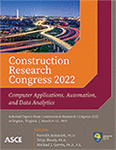Developing BIM-Based Linked Data Digital Twin Architecture to Address a Key Missing Factor: Occupants
Publication: Construction Research Congress 2022
ABSTRACT
This study reviews the concept of Digital Twins (DTs) and related studies in the construction industry and identifies three key factors that is missing from the current practices. The missing factors are: (1) inadequate consideration of occupants in DT models, (2) lack of the inclusion of unstructured data, and (3) absence of Linked Data technologies. To address these issues, architecture for the design of DTs is proposed and partially implemented in a case study. The proposed architecture utilizes semantic web technologies and proposes a linked data approach to integrate different data sources of a DT. Further, the architecture leverages machine learning approaches to dynamically update and enrich the linked data platform and automate its maintenance. The case study takes the first step to integrate BIM and unstructured data generated by occupants (as work orders) using a linked-data approach. The research sets the path for future works in the domain of building DTs.
Get full access to this article
View all available purchase options and get full access to this chapter.
REFERENCES
Austin, M., Delgoshaei, P., Coelho, M., and Heidarinejad, M. 2020. Architecting Smart City Digital Twins: Combined Semantic Model and Machine Learning Approach. Journal of Management in Engineering, 36(4), p.04020026.
Boje, C., Guerriero, A., Kubicki, S., and Rezgui, Y. 2020. Towards a semantic Construction Digital Twin: Directions for future research. Automation in Construction, 114, p.103179.
Chen, Q., García de Soto, B., and Adey, B. T. 2018. “Construction automation: Research areas, industry concerns and suggestions for advancement.” Autom. Constr. 94 (June): 22–38. https://doi.org/10.1016/j.autcon.2018.05.028.
Cheng, J. C., Chen, W., Chen, K., and Wang, Q. 2020. Data-driven predictive maintenance planning framework for MEP components based on BIM and IoT using machine learning algorithms. Automation in Construction, 112, p.103087.
Coleman, S., Touchie, M. F., Robinson, J. B., and Peters, T. 2018. Rethinking performance gaps: A regenerative sustainability approach to built environment performance assessment. Sustainability, 10(12), p.4829.
Ding, K., Shi, H., Hui, J., Liu, Y., Zhu, B., Zhang, F., and Cao, W. 2018, March. Smart steel bridge construction enabled by BIM and Internet of Things in industry 4.0: A framework. In 2018 IEEE 15th International Conference on Networking, Sensing and Control (ICNSC) (pp. 1–5). IEEE.
Erfani, A., Tavakolan, M., Mashhadi, A. H., and Mohammadi, P. 2021. Heterogeneous or homogeneous? A modified decision-making approach in renewable energy investment projects. AIMS Energy, 9(3), pp.558–580.
Erfani, A., Zhang, K., and Cui, Q. 2021. TAB Bid Irregularity: Data-Driven Model and Its Application. Journal of Management in Engineering, 37(5), p.04021055.
Francisco, A., Mohammadi, N., and Taylor, J. E. 2020. Smart City Digital Twin–Enabled Energy Management: Toward Real-Time Urban Building Energy Benchmarking. Journal of Management in Engineering, 36(2), p.04019045.
Heravi, G., Taherkhani, A. H., Sobhkhiz, S., Mashhadi, A. H., and Zahiri-Hashemi, R. 2021. Integrating risk management’s best practices to estimate deep excavation projects’ time and cost. Built Environment Project and Asset Management.
Khajavi, S. H., Motlagh, N. H., Jaribion, A., Werner, L. C., and Holmström, J. 2019. Digital Twin: Vision, Benefits, Boundaries, and Creation for Buildings. IEEE Access, 7, pp.147406–147419.
Lin, Y. C., and Cheung, W. F. 2020. Developing WSN/BIM-Based Environmental Monitoring Management System for Parking Garages in Smart Cities. Journal of Management in Engineering, 36(3), p.04020012.
Lu, Q., Parlikad, A. K., Woodall, P., Don Ranasinghe, G., Xie, X., Liang, Z., Konstantinou, E., Heaton, J., and Schooling, J. 2020. Developing a Digital Twin at Building and City Levels: Case Study of West Cambridge Campus. Journal of Management in Engineering, 36(3), p.05020004.
Mohammadi, N., and Taylor, J. 2020, January. Knowledge Discovery in Smart City Digital Twins. In Proceedings of the 53rd Hawaii International Conference on System Sciences.
Mohd Nawi, M. N., Baluch, N. H., and Bahaudin, A. Y. 2014. Impact of fragmentation issue in construction industry: An overview. In MATEC web of conferences (Vol. 15, p. 01009). EDP Sciences.
Oliver, D., Adam, D., and Hudson-Smith, A. P. 2018. Living with a digital twin: Operational management and engagement using IoT and Mixed Realities at UCL’s Here East Campus on the Queen Elizabeth Olympic Park. In Giscience and Remote Sensing. GIS Research UK (GISRUK).
Pargmann, H., Euhausen, D., and Faber, R. 2018, April. Intelligent big data processing for wind farm monitoring and analysis based on cloud-technologies and digital twins: A quantitative approach. In 2018 IEEE 3rd International Conference on Cloud Computing and Big Data Analysis (ICCCBDA) (pp. 233–237). IEEE.
Sobhkhiz, S., Taghaddos, H., Rezvani, M., and Ramezanianpour, A. M. 2021. Utilization of semantic web technologies to improve BIM-LCA applications. Automation in Construction, 130, p.103842.
Tang, S., Shelden, D. R., Eastman, C. M., Pishdad-Bozorgi, P., and Gao, X. 2019. A review of building information modeling (BIM) and the internet of things (IoT) devices integration: Present status and future trends. Automation in Construction, 101, pp.127–139.
Tomko, M., and Winter, S. 2019. Beyond digital twins–A commentary. Environment and Planning B: Urban Analytics and City Science, 46(2), pp.395–399.
Wu, I., and Liu, C. C. A Visual and Persuasive Energy Conservation System Based on BIM and IoT Technology. Sensors. 2020 Jan;20(1):139.
Zheng, Y., Yang, S., and Cheng, H. 2019. An application framework of digital twin and its case study. Journal of Ambient Intelligence and Humanized Computing, 10(3), pp.1141–1153.
Information & Authors
Information
Published In
History
Published online: Mar 7, 2022
Authors
Metrics & Citations
Metrics
Citations
Download citation
If you have the appropriate software installed, you can download article citation data to the citation manager of your choice. Simply select your manager software from the list below and click Download.
